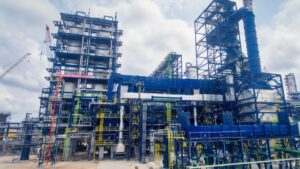
Russia says OPEC+ deal returns investment to oil industry
The Organization of Petroleum Exporting Countries, (OPEC+) interventions on the market in recent years have helped the oil industry to see the beginning of the return of confidence and investments, Russian Deputy Prime Minister Alexander Novak told Russian TV channel Rossiya 24 in an interview on Friday.
“We positively assess the joint actions since 2016. They allowed us to return investments and restore confidence in the industry. This is a strategically longer period for planning our activities,” Novak told Rossiya 24 in an interview to mark the fifth anniversary of the first OPEC+ agreement reached in December 2016.
Back then, OPEC and a group of a dozen non-OPEC oil producers led by Russia started to manage the supply in order to limit production and balance the market.
The most difficult meeting for OPEC+ was the one in March 2020, when countries couldn’t reach consensus on how to proceed with the collective oil supply at the start of the pandemic, Novak told Rossiya 24.
A month after the deal collapsed and Russia and Saudi Arabia were in a price war in March and early April 2020, the OPEC+ members realized that they need to cut a massive amount of oil production in order to bring the market back to balance while demand and prices were crashing with the pandemic.
OPEC+ is still unwinding those 10 million barrels per day (bpd) total cuts, by easing them by 400,000 bpd every month.
Earlier in December, the group surprised many market observers by sticking to its plan to ease the production cuts in January by 400,000 bpd, despite mounting evidence of a larger-than-expected oil surplus early next year.
OPEC+ may have brought more stability to the market, but investments post-COVID are still lagging behind pre-pandemic levels, industry officials and analysts warn.
Upstream oil and gas investment must rise to the pre-pandemic levels of around $525 billion per year through the end of the decade so that the industry can ensure a demand-supply balance, Saudi Arabia-based International Energy Forum (IEF) and IHS Markit said in a report this week. This year, upstream investment is still depressed, for a second year in a row, and is estimated at around $341 billion, they added.
OPEC Secretary General, Mohammad Barkindo warned the audience at the World Petroleum Congress this week that cutting investments in oil and gas production is misguided. Insufficient investment in new oil and gas supply would lead to energy shortages, as well as market imbalances and higher prices, Barkindo added.



